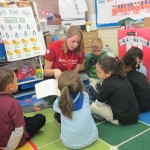Students need to feel safe and have supportive relationships for their social, emotional, and academic learning to be optimized. Students experiencing trauma, such as from public health crises, weather disasters, or other upsetting events, may have been exposed to unpredictable schedules, inconsistent supervision, or food insecurity and desperately need school to be their safest, most predictable, and most positive setting, especially if they have been displaced or are without utilities or basic comforts.
This practice brief shares tips for maintaining continuity of learning through defining classroom expectations for remote (i.e., distance) instruction and online learning environments. With a few adaptations, teachers can use a PBIS framework to make remote learning safe, predictable, and positive.
School-wide positive behavioral interventions and supports (PBIS) is an evidence-based framework for improving school climate, social-emotional competence, and academic achievement, and decreasing unsafe behavior in schools. Just as in a brick-and-mortar school, PBIS can be used to make virtual (i.e., online) education more effective.
For the past four years, the Northeast Positive Behavioral Interventions and Supports (PBIS) Academy, an evidence-based professional development program in the area of social-emotional development, has been used across the state of Massachusetts. Administered by the Neag School of Education through its affiliation with the Northeast PBIS (NEPBIS) Network, a loose affiliation of state education leaders in the Northeast, the PBIS Academy has announced it will continue its partnership with Massachusetts through the spring of 2022, after a bid to renew its contract for four additional years was recently approved.
E.B. Kennelly School in Hartford, Conn., hosted the second annual “UConn Day” at the school on May 2, an event that included a schoolwide parade and a basketball game with students playing against the teachers and staff.
“The standards call attention to the positive things that you should be doing. Traditional school rules outline all the things we don’t want to see in schools,” said Brandi Simonsen, the co-director of the University of Connecticut’s Center for Behavioral Education and Research.
Nowadays, there are new motivators and mantras at the Maxfield Park Primary School. Throughout the day, both inside and outside of the school, students are guided by a set of core values — being safe, responsible and respectful. Beverley Gallimore-Vernon has been leading the shift in behaviour at the school since she became principal a little over one year ago, and much of her success is attributable to the school-wide positive behaviour intervention and support (SWPBIS) program that the school has been piloting under the guidance of the Ministry of Education.
The following PBIS Practitioners Guide — titled National Climate Change: 5 Ways Schools Can Positively and Proactively Support All Students — originally appeared on the OSEP Center on Positive Behavioral Interventions and Supports website and is authored by Neag School faculty Brandi Simonsen, George Sugai, Jennifer Freeman, and Tamika La Salle.
WNPR (Neag School’s George Sugai was a guest panelist on zero tolerance policies in Connecticut)
George Sugai, a professor in UConn’s Neag School of Education and an expert on school climate and student behavior, addressed a conference in February that included Vice President Joe Biden on the topic of making schools safer in the wake of the Sandy Hook School tragedy. Sugai, who in December co-authored a national position paper […]
As sure as school bells begin to ring after Memorial Day, so too do news stories appear of students in elementary, middle, and high school being bullied. Some school districts have a new state “cyber bullying” law that allows administrators to punish students for what they say online. With one out of every three online […]





